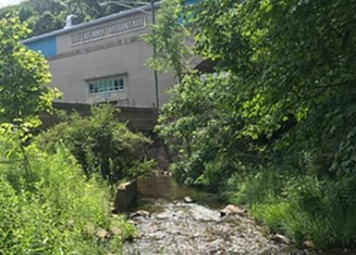
PA Turnpike Strives to Keep Waterways Clean Through MS4
But since he came to the PA Turnpike, Noss is constantly thinking about water – and how to keep it clean, particularly near our highways and construction sites.
Noss is an engineer project manager who helps lead the Turnpike’s MS4 program. That’s the Municipal Separate Storm Sewer System, a regulatory requirement handed down by the Pennsylvania Department of Environmental Protection in an effort to reduce the amount of pollutants that drain into our waterways.
“I think that everybody in Pennsylvania, regardless of where you work, what you do and where you live, appreciates and values clean water in our streams, rivers and lakes,” Noss said. “It’s something we all have in common -- the need for clean water.”
Years ago, roads and urban developments were built on impervious surfaces, running stormwater off to nearby bodies of water rather than letting it into soak into the ground. As society grew to be more environmentally conscious, we learned this style of construction was polluting our water.
As an MS4 permit holder, the Turnpike is tasked with developing, implementing and enforcing a storm water management program designed to prevent or reduce pollution from running into the streams that drain into the Ohio River, Chesapeake Bay or Delaware River basins, depending on where you are on the state-spanning Turnpike.
While environmental protection can often take time to develop in a culture, Noss said the Turnpike has embraced it and has been an MS4 permittee since 2006, working to prevent pollution and planning projects to do so in the future.
If there is a fuel spill at a maintenance facility, for example, there are now expanded protocols in place on just how to clean it up, keep it from getting into the waterway and how to document what was needed to do so, Noss explained.
MS4 requires reporting on construction site stormwater activities to ensure they meet state regulations and tracking how stormwater is treated after construction has wrapped. The Turnpike is currently reporting on roughly 800 of these control measures that manage the stormwater coming off of our roadways. They reduce flooding, allow water to soak into the ground or improve water quality – or all three.
Education is a big component of the program, as well, and every Turnpike employee and roadway construction contractor must take MS4 training to incorporate pollution reduction into their jobs.
With an updated MS4 permit issued in November, Noss said the program is kicking into high gear in 2022 with plans to reduce more than 450,000 pounds of sediment from entering waterways in urbanized areas, accounting for about 40% of the Turnpike system. Noss noted that is above and beyond existing environmental regulations for construction projects.
Looking back, Noss never thought he’d be doing environmental work, but he found a love for it and is dedicated to it, and he’s pleased to see the Turnpike is, too.
“Everybody has to do their part to keep our environment clean and safe,” Noss said. “This is one way the Turnpike can do its part.”
To learn more about the Turnpike’s efforts to reduce runoff pollutants and maintain clean water systems, visit our Clean Water Initiative page.
By Steve Marroni, PA Turnpike Communications Specialist

